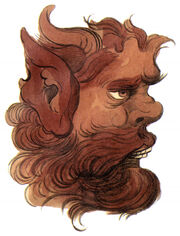
A portrait of Theutus from Francis Barrett's The Magus, 1801)
Theutus is a demon described by the Renaissance magician Cornelius
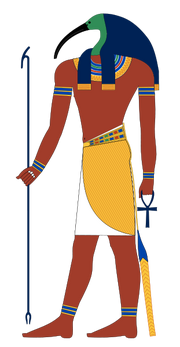
Thoth, in one of his forms as an ibis-headed man
Agrippa.
Rank[]
According to Cornelius Agrippa Theutus belongs to the order of demons known as the Vessels of Iniquity, also called the Vessels of Wrath: "these are the inventors of evil things and of all wicked arts, as in Plato, that devil Theutus" (Occult Philosophy, Book 3, Chapter 18). Agrippa placed the Vessels of Iniquity in Binah, the third Sephirah on the Tree of the Kabbalah.
Agrippa's reference is to Plato's dialogue Phaedrus where the Egyptian god of magic and learning, Thoth, is described: "The story is that in the region of Naucratis in Egypt there dwelt one of the old gods of the country, the god to whom the bird called Ibis is sacred, his own name being Theuth. He it was that invented number and calculation, geometry and astronomy, not to speak of draughts and dice, and above all writing."
Powers[]
Theutus is a degenerate version of the great Egyptian god Thoth. Since Thoth was credited with teaching humanity numbers and their manipulation, he is naturally the god of gambling, which requires the use of numbers.
Names[]
Thoth[]
Thoth, like many Egyptian gods and nobility, held many titles. Among these were "Scribe of Ma'at in the Company of the Gods," "Lord of Ma'at," "Lord of Divine Words," "Judge of the Two Combatant Gods," "Judge of the Rekhekhui, the pacifier of the Gods, who Dwelleth in Unnu, the Great God in the Temple of Abtiti," "Twice Great," "Thrice Great," "Three Times Great," and also "The Timeless."
Etymology[]
The Egyptian pronunciation of ḏḥwty is not fully known, but may be reconstructed as *ḏiḥautī, based on the Ancient Greek borrowing Θώθ Thōth or Theut and the fact that it evolved into Sahidic Coptic variously as Thoout, Thōth, Thoot, Thaut as well as Bohairic Coptic Thōout. The final -y may even have been pronounced as a consonant, not a vowel. However, many write "Djehuty", inserting the letter 'e' automatically between consonants in Egyptian words, and writing 'w' as 'u', as a convention of convenience for English speakers, not the transliteration employed by Egyptologists.
According to Theodor Hopfner, Thoth's Egyptian name written as ḏḥwty originated from ḏḥw, claimed to be the oldest known name for the Ibis although normally written as hbj. The addition of -ty denotes that he possessed the attributes of the Ibis. Hence his name means "He who is like the Ibis".
Further names and spellings[]
Djehuty is sometimes alternatively rendered as Jehuti, Tahuti, Tehuti, Zehuti, Techu, or Tetu. Thoth (also Thot or Thout) is the Greek version derived from the letters ḏḥwty. Not counting differences in spelling, Thoth had many names and titles, like other goddesses and gods. (Similarly, each Pharaoh, considered a god himself, had five different names used in public.) Among the names used are A, Sheps, Lord of Khemennu, Asten, Khenti, Mehi, Hab, and A'an.
In addition, Thoth was also known by specific aspects of himself, for instance the moon god Iah-Djehuty, representing the Moon for the entire month,. The Greeks related Thoth to their god Hermes due to his similar attributes and functions. One of Thoth's titles, "Three times great, great" was translated to the Greek τρισμεγιστος (Trismegistos) making Hermes Trismegistus.
Hermes[]
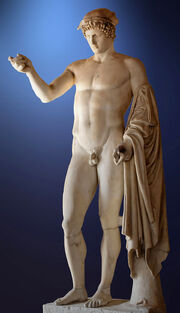
Hermes
The earliest form of the name Hermes is the Mycenaean Greek *e-ma-a2 , written in Linear B syllabic script. Most scholars derive "Hermes" from Greek herma (a stone, roadside shrine or boundary marker), dedicated to Hermes as a god of travelers and boundaries; the etymology of herma itself is unknown. "Hermes" may be related to Greek hermeneus ("the interpreter"), reflecting Hermes's function as divine messenger. Plato offers a Socratic folk-etymology for Hermes's name, deriving it from the divine messenger's reliance on eirein (the power of speech). Scholarly speculation that "Hermes" derives from a more primitive form meaning "one cairn" is disputed. The word "hermeneutics", the study and theory of interpretation, is derived from hermeneus. In Greek a lucky find is a hermaion. In classical mythology he was considered the son of Zeus and Maia, and became one of the most important Olympian deities, since as a god of travel he was a patron of travelers, thieves, athletes, shepherds and heroes, was associated with commerce, speed, cunning, wit and sleep. He was also seen as a psychopomp to the underworld, bringing the souls of the dead to Charon, would take them further down.
He was also a patron of heroes, and he alongside his sister Athena, helped the likes of Heracles, Perseus and Odysseus during their adventures and quests.
Mercury[]
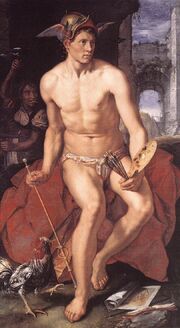
Mercury
Mercury is known to the Romans as Mercurius and occasionally in earlier writings as Merqurius, Mirqurios or Mircurios, had a number of epithets representing different aspects or roles, or representing syncretisms with non-Roman deities. The most common and significant of these epithets included the following:
- Mercurius Artaios, a combination of Mercury with the Celtic god Artaios, a deity of bears and hunting who was worshiped at Beaucroissant, France.
- Mercurius Arvernus, a combination of the Celtic Arvernus with Mercury. Arvernus was worshiped in the Rhineland, possibly as a particular deity of the Arverni tribe, though no dedications to Mercurius Arvernus occur in their territory in the Auvergne region of central France.
- Mercurius Cissonius, a combination of Mercury with the Celtic god Cissonius, who is written of in the area spanning from Cologne, Germany to Saintes, France.
- Mercurius Esibraeus, a combination of the Iberian deity Esibraeus with the Roman deity Mercury. Esibraeus is mentioned only in an inscription found at Medelim, Portugal, and is possibly the same deity as Banda Isibraiegus, who is invoked in an inscription from the nearby village of Bemposta.
- Mercurius Gebrinius, a combination of Mercury with the Celtic or Germanic Gebrinius, known from an inscription on an altar in Bonn, Germany.
- Mercurius Moccus, from a Celtic god, Moccus, who was equated with Mercury, known from evidence at Langres, France. The name Moccus ("pig") implies that this deity was connected to boar-hunting.
Odin[]
He was was referred to by more than 200 names which hint at his various roles. Among others, he was known as Yggr (terror), Sigfodr (father of Victory) and Alfodr (All Father) in the skaldic and Eddic traditions of heiti and kennings, a poetic method of indirect reference, as in a riddle.
Some epithets establish Odin as a father god: Alföðr, "all-father", "father of all"; Aldaföðr, "father of men (or of the age)"; Herjaföðr, "father of hosts"; Sigföðr, "father of victory"; and Valföðr, "father of the slain".
See: Woden or Hold Nickar
Depictions[]
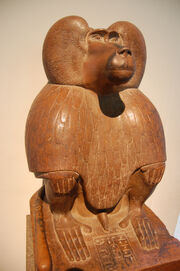
Depiction of Thoth as a baboon (c. 1400 BC), in the British Museum
Thoth has been depicted in many ways depending on the era and on the aspect the artist wished to convey. Usually, he is depicted in his human form with the head of an ibis. In this form, he can be represented as the reckoner of times and seasons by a headdress of the lunar disk sitting on top of a crescent moon resting on his head. When depicted as a form of Shu or Ankher, he was depicted to be wearing the respective god's headdress. Sometimes he was also seen in art to be wearing the Atef crown or the United Crowns of Upper and Lower Egypt. When not depicted in this common form, he sometimes takes the form of the ibis directly.
He also appears as a dog faced baboon or a man with the head of a baboon when he is A'an, the god of equilibrium. In the form of A'ah-Djehuty he took a more human-looking form. These forms are all symbolic and are metaphors for Thoth's attributes. The Egyptians did not believe these gods actually looked like humans with animal heads. For example, Ma'at is often depicted with an ostrich feather, "the feather of truth," on her head, or with a feather for a head.
Attributes[]
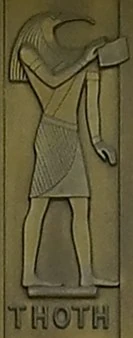
Lee Lawrie, Thoth (1939). Library of Congress John Adams Building, Washington, D.C.
Thoth's roles in Egyptian mythology were many. He served as a mediating power, especially between good and evil, making sure neither had a decisive victory over the other. He also served as scribe of the gods, credited with the invention of writing and alphabets (i.e. hieroglyphs) themselves. In the underworld, Duat, he appeared as an ape, A'an, the god of equilibrium, who reported when the scales weighing the deceased's heart against the feather, representing the principle of Ma'at, was exactly even.
The ancient Egyptians regarded Thoth as One, self-begotten, and self-produced. He was the master of both physical and moral (i.e. Divine) law, making proper use of Ma'at. He is credited with making the calculations for the establishment of the heavens, stars, Earth, and everything in them. Compare this to how his feminine counterpart, Ma'at was the force which maintained the Universe. He is said to direct the motions of the heavenly bodies. Without his words, the Egyptians believed, the gods would not exist. His power was unlimited in the Underworld and rivaled that of Ra and Osiris.
The Egyptians credited him as the author of all works of science, religion, philosophy, and magic. The Greeks further declared him the inventor of astronomy, astrology, the science of numbers, mathematics, geometry, land surveying, medicine, botany, theology, civilized government, the alphabet, reading, writing, and oratory. They further claimed he was the true author of every work of every branch of knowledge, human and divine.
Mythology[]
Thoth has played a prominent role in many of the Egyptian myths. Displaying his role as arbitrator, he had overseen the three epic battles between good and evil. All three battles are fundamentally the same and belong to different periods. The first battle took place between Ra and Apophis, the second between Heru-Bekhutet and Set, and the third between Horus, the son of Osiris, and Set. In each instance, the former god represented order while the latter represented chaos. If one god was seriously injured, Thoth would heal them to prevent either from overtaking the other.
Thoth was also prominent in the Osiris myth, being of great aid to Isis. After Isis gathered together the pieces of Osiris' dismembered body, he gave her the words to resurrect him so she could be impregnated and bring forth Horus. When Horus was slain, Thoth gave the magic to resurrect him as well. Thoth was the god who always speaks the words that fulfill the wishes of Ra.
This mythology also credits him with the creation of the 365 day calendar. Originally, according to the myth, the year was only 360 days long and Nut was sterile during these days, unable to bear children. Thoth gambled with the Moon for 1/72nd of its light (360/72 = 5), or 5 days, and won. During these 5 days, Nut gave birth to Kheru-ur (Horus the Elder, Face of Heaven), Osiris, Set, Isis, and Nepthys.
History[]

Thoth, sitting on his throne
He was originally the deification of the Moon in the Ogdoad belief system. Initially, in that system, the Moon had been seen to be the eye of Horus, the sky god, which had been semi-blinded (thus darker) in a fight against Set, the other eye being the Sun. However, over time it began to be considered separately, becoming a lunar deity in its own right, and was said to have been another son of Ra. As the crescent moon strongly resembles the curved beak of the ibis, this separate deity was named Djehuty (i.e. Thoth), meaning ibis.
The Moon not only provides light at night, allowing the time to still be measured without the sun, but its phases and prominence gave it a significant importance in early astrology/astronomy. The cycles of the Moon also organized much of Egyptian society's civil, and religious, rituals, and events. Consequently, Thoth gradually became seen as a god of wisdom, magic, and the measurement, and regulation, of events, and of time. He was thus said to be the secretary and counselor of Ra, and with Ma'at (truth/order) stood next to Ra on the nightly voyage across the sky, Ra being a sun god.
Thoth became credited by the ancient Egyptians as the inventor of writing, and was also considered to have been the scribe of the underworld, and the Moon became occasionally considered a separate entity, now that Thoth had less association with it, and more with wisdom. For this reason Thoth was universally worshipped by ancient Egyptian Scribes. Many scribes had a painting or a picture of Thoth in their "office". Likewise, one of the symbols for scribes was that of the ibis.
In art, Thoth was usually depicted with the head of an ibis, deriving from his name, and the curve of the ibis' beak, which resembles the crescent moon. Sometimes, he was depicted as a baboon holding up a crescent moon, as the baboon was seen as a nocturnal, and intelligent, creature. The association with baboons led to him occasionally being said to have as a consort Astennu, one of the (male) baboons at the place of judgment in the underworld, and on other occasions, Astennu was said to be Thoth himself.
During the late period of Egyptian history a cult of Thoth gained prominence, due to its main centre, Khnum (Hermopolis Magna), also becoming the capital, and millions of dead ibis were mummified and buried in his honour. The rise of his cult also led to his cult seeking to adjust mythology to give Thoth a greater role.
Thoth was inserted in many tales as the wise counsel and persuader, and his association with learning, and measurement, led him to be connected with Seshat, the earlier deification of wisdom, who was said to be his daughter, or variably his wife. Thoth is also known as the Greek god Hermes, with whom Thoth was eventually combined, as Hermes Trismegistus, also leading to the Greeks naming Thoth's cult centre as Hermopolis, meaning city of Hermes.
It is also considered that Thoth was the scribe of the gods rather than a messenger. Anubis (or Hermanubis) was viewed as the messenger of the gods, as he travelled in and out of the Underworld and presented himself to the gods and to humans. It is more widely accepted that Thoth was a record keeper, not a divine messenger. In the Papyrus of Ani copy of the Egyptian Book of the Dead the scribe proclaims "I am thy writing palette, O Thoth, and I have brought unto thee thine ink-jar. I am not of those who work iniquity in their secret places; let not evil happen unto me." Chapter XXXb (Budge) of the Book of the Dead is by the oldest tradition said to be the work of Thoth himself.
There was also an Egyptian pharaoh of the Sixteenth dynasty of Egypt named Djehuty (Thoth) after him, and who reigned for three years.
Symbols[]
Rank: Recorder of Script and Legal Documents in Jinnestan; The Grand Office Gender Associated: Male Zodiac Sign: Gmini-Cancer(?) Season: Autumn Direction: North Day: Wednesday Planet: Mercury Metal: Zinc Gemstone: Emerald Element: Earth Animal: Ibis Color: Green Taste: Mixed Food: Mung bean Body Part: Skin Tarot Card: 3 of Rods(?)
